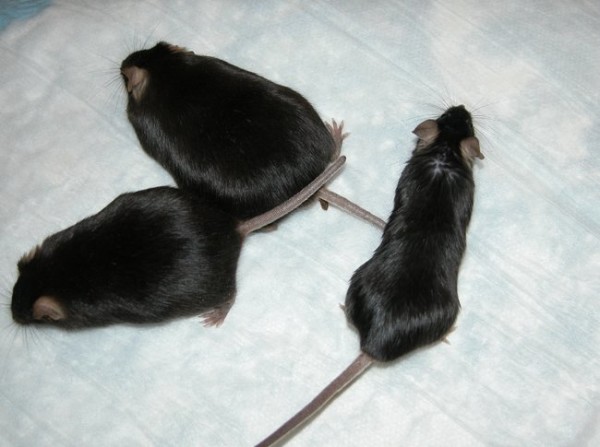In Pic :The smaller mouse, right, lost weight after gastric bypass surgery, while the heavier ones, left, had “sham” operations.
The bacterial makeup of the intestines may help determine whether people gain weight or lose it, according to two new studies, one in humans and one in mice.
The research also suggests that a popular weight-loss operation, gastric bypass, which shrinks the stomach and rearranges the intestines, seems to work in part by shifting the balance of bacteria in the digestive tract. People who have the surgery generally lose 65 percent to 75 percent of their excess weight, but scientists have not fully understood why. Now, the researchers are saying that bacterial changes may account for 20 percent of the weight loss.
The findings mean that eventually, treatments that adjust the microbe levels, or “microbiota,” in the gut may be developed to help people lose weight without surgery, said Dr. Lee M. Kaplan, director of the obesity, metabolism and nutrition institute at the Massachusetts General Hospital, and an author of a study published Wednesday in Science Translational Medicine.
Not everyone who hopes to lose weight wants or needs surgery to do it, he said. About 80 million people in the United States are obese, but only 200,000 a year have bariatric operations.
“There is a need for other therapies,” Dr. Kaplan said. “In no way is manipulating the microbiota going to mimic all the myriad effects of gastric bypass. But if this could produce 20 percent of the effects of surgery, it will still be valuable.”
In people, microbial cells outnumber human ones, and the new studies reflect a growing awareness of the crucial role played by the trillions of bacteria and other microorganisms that live in their own ecosystem in the gut. Perturbations there can have profound and sometimes devastating effects.
One example is infection with a bacterium called C. difficile, which sometimes takes hold in people receiving antibiotics for other illnesses. The drugs can wipe out other organisms that would normally keep C. difficile in check. Severe cases can be life-threatening, and the medical profession is gradually coming to accept the somewhat startling idea that sometimes the best therapy is a fecal transplant — from a healthy person to the one who is sick, to replenish the population of “good germs.”
Dr. Kaplan said his group’s experiments were the first to try to find out if microbial changes could account for some of the weight loss after gastric bypass. Earlier studies had shown that the microbiota of an obese person changed significantly after the surgery, becoming more like that of someone who was thin. But was the change from the surgery itself, or from the weight loss that followed the operation? And did the microbial change have any effects of its own?
Because it would be difficult and time-consuming to study these questions in people, the researchers used mice, which they had fattened up with a rich diet. One group had gastric bypass operations, and two other groups had “sham” operations in which the animals’ intestines were severed and sewn back together. The point was to find out whether just being cut open, without having the bypass, would have an effect on weight or gut bacteria. One sham group was kept on the rich food, while the other was put on a weight-loss diet.
In the bypass mice, the microbial populations quickly changed, and the mice lost weight. In the sham group, the microbiota did not change much — even in those on the weight-loss diet.
Next, the researchers transferred intestinal contents from each of the groups into other mice, which lacked their own intestinal bacteria. The animals that received material from the bypass mice rapidly lost weight; stool from mice that had the sham operations had no effect.
Exactly how the altered intestinal bacteria might cause weight loss is not yet known, the researchers said. But somehow the microbes seem to rev up metabolism so that the animals burn off more energy.
A next step, Dr. Kaplan said, may be to take stool from people who have had gastric bypass and implant it into mice to see if causes them to lose weight. Then the same thing could be tried from person to person.
“In addition, we’ve identified four subsets of bacteria that seem to be most specifically enhanced by the bypass,” Dr. Kaplan said. “Another approach would be to see if any or all of those individual bacteria could mediate the effects, rather than having to transfer stool.”
A second study by a different group found that overweight people may be more likely to harbor a certain type of intestinal microbe. The microbes may contribute to weight gain by helping other organisms to digest certain nutrients, making more calories available. That study was published Tuesday in the Journal of Clinical Endocrinology & Metabolism.
The study involved 792 people who had their breath analyzed to help diagnose digestive orders. They agreed to let researchers measure the levels of hydrogen and methane; elevated levels indicate the presence of a microbe called Methanobrevibacter smithii. The people with the highest readings on the breath test were more likely to be heavier and have more body fat, and the researchers suspect that the microbes may be at least partly responsible for their obesity.
This type of organism may have been useful thousands of years ago, when people ate more roughage and needed all the help they could get to squeeze every last calorie out of their food. But modern diets are much richer, said an author of the study, Dr. Ruchi Mathur, director of the diabetes outpatient clinic at Cedars-Sinai Medical Center in Los Angeles.
“Our external environment is changing faster than our internal one,” Dr. Mathur said. Studies are under way, she said, to find out whether getting rid of this particular microbe will help people lose weight.






Leave a reply